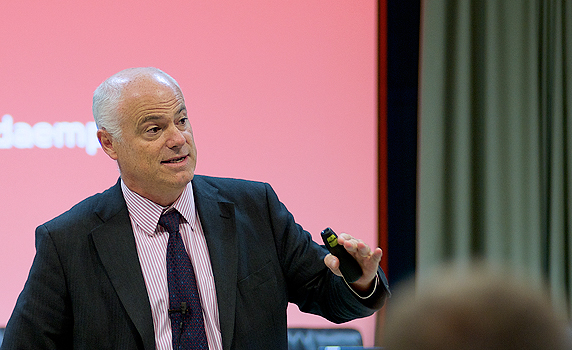
Up until now, the framework for a single European banking supervising body is the one in which there has been the most progress, according to IESE Prof. José M. Campa.
"In fact, this framework should be effective from the fall of 2014. There is a consensus about the foundations of banking union. The debate hinges on whether we are going in the right direction," he said, during the session "The Outlook for the European Banking Union: Implications for Business Finance" given at the 19th Business Conference held on October 1 on IESE’s Madrid campus.
However, the professor said a framework for single resolution mechanism has still to be approved. In spite of everything, not even in the eurozone’s deepest moments of crisis, such as in Cyprus last year, have there been movements of deposits between the various countries.
"The euro is a currency that is too credible and this might be its only problem," he said. He pointed out that during recent months three countries had joined the single currency and even Switzerland has pinned its exchange rate to the euro.
Campa discussed why it is urgent that a European banking union comes into force as soon as possible. The European banking sector is bigger than that of the United States or Japan. "This means that we have many large banks in small states," he said.
During his talk, the professor expressed their opinion that there are no symptoms that Germany’s solvency is vulnerable, and that an inflation rate above 2 percent is not dramatic either for the German or the European economy. He added that the Spanish economic recovery would continue to be slow and painful.
Business must reestablish its central role in society
The dean of IESE, Jordi Canals pointed to the main challenge every business must confront: reestablishing its central role in society.
"We have confused building companies with doing business and doing business with getting rich. Greed has led us to forget that companies are much more than the business they do," he warned. The solution is to make the company into a dynamic, creative and positive social agent. In order to do this, business people need to act and think in the long term and avoid short-term thinking. "If we don’t think like this we will be at the edge of the abyss," he said.
In conclusion, Canals emphasized the importance that entrepreneurial initiative has in certain economies as a driving force for extraordinary social change. "We need to encourage this entrepreneurial spirit within our organizations," he said. Canals closed the session reminding his audience of the importance of leadership in having a positive impact both on society and on business. "People are what make the difference in organizations," he said.
The conference was also addressed by IESE Prof. Javier Zamora, who gave a talk entitled "The Executive in the Digital Era: A New Management Discipline?." The director of IESE in Madrid, Francisco Iniesta, took charge of presenting the event.